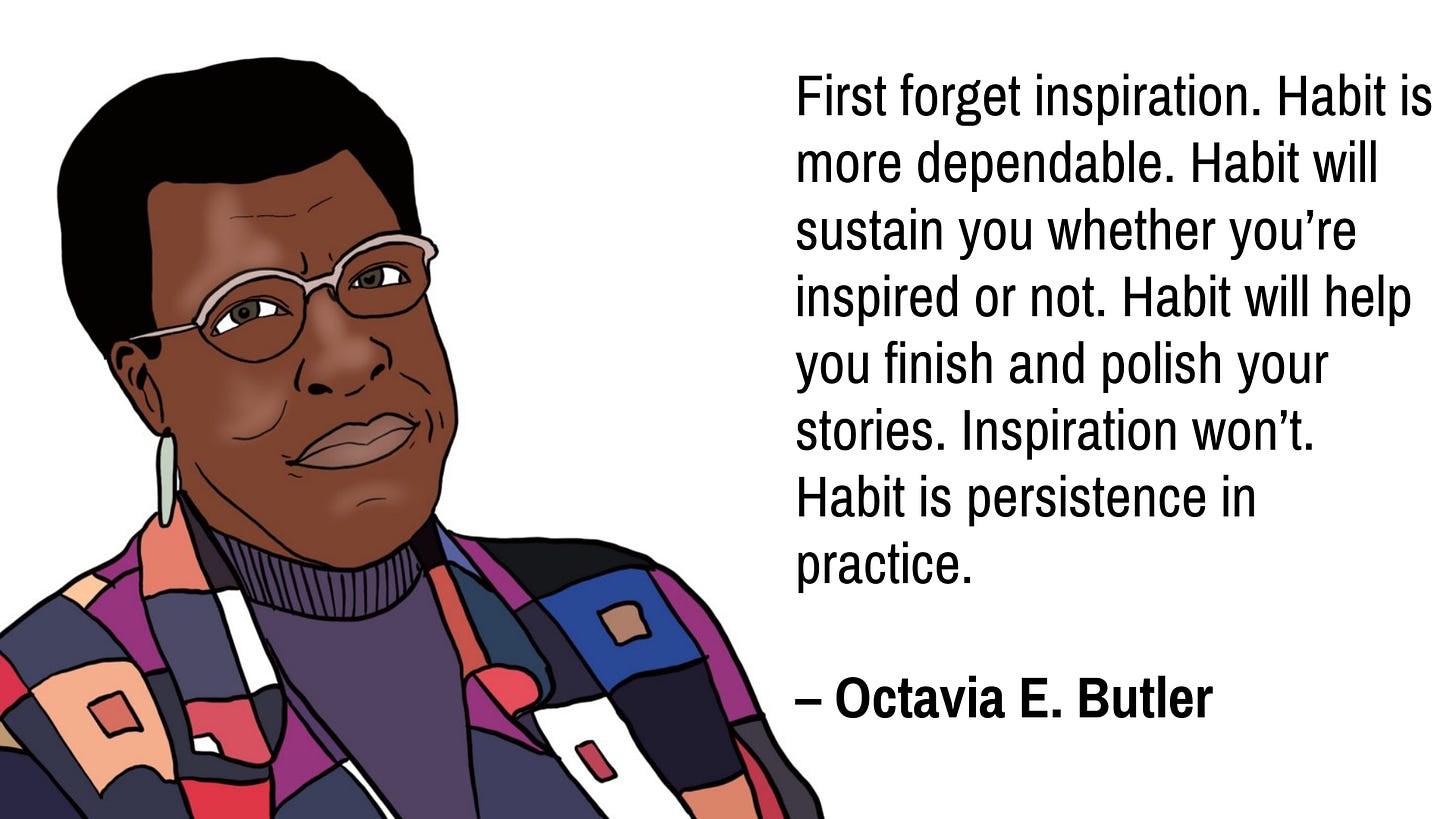How many days does it take to build a writing habit?
It's complicated! But don't get put off - here's three easy approaches to making writing more routine.
You might have heard that it takes 21 days to create a habit and around the same time to break one. Some say it’s around three months. Other studies have found it takes 254 days – which seems both an oddly specific and a depressingly long amount of time.
So, what’s the answer?
Professor Wendy Wood is one of the world’s leading authorities on habit formation and she says that by definition, habits are when a behaviour becomes automatic.1 Habits require no willpower or conscious decision making, so are more of a reflex than a choice.
There have been many studies measuring how long it takes for ‘automaticity’ to kick in and a habit to stick, but there doesn’t seem to be much in the way of agreement.
It depends (sorry)
It makes sense when you think about it. How long it takes depends on what you are trying to do, what’s driving you, and the context in which you find yourself.
Simple answers are nice to hear and appealing to give – I get it. However, I’d argue that when it comes to habits, a lack of specificity is no bad thing. The problem with fixed answers is that they can demotivate you. They can make you feel that if you haven’t formed a perfect habit by day 20 something is ‘wrong’ with you or your approach.
I’d also argue that some behaviours are more likely to become automatic than others.
Brushing your teeth before bed every night is of a different order than sitting down at 8am every morning to write for an hour.
I’d go so far to say that writing can never be habitual in the strict neurological sense - but you probably knew that anyway. Writing is cognitively demanding and requires more conscious effort than brushing your teeth.
3 ways to make writing more habitual
When most people say they want a writing habit they simply want to write more regularly with a bit less stress and effort.
If that sounds like you, here are three ways to fit writing into your life:
Find a time that you can control. Wood found that parents of toddlers have fewer habitual behaviours than anyone else. Habits require the repetition of a behaviour at roughly the same time and place each day and those little bundles of joy tend to interrupt our nice, neat plans. If your life is unpredictable (whether you have kids or not), Wood advises that you try to find a some time in your day (however small) that you can control. Early in the morning, late at night, on your commute, in the bathroom – the time or place is up to you.
Find the feel good. The author of Tiny Habits B.J. Fogg said that ‘People change best by feeling good, not by feeling bad’. Habits are formed when actions are rewarded making us more likely to repeat them. Associating positive feelings with our actions will encourage that behaviour. While writing isn’t always going to give us a huge surge of dopamine every time we complete a session, we have a better chance of building a habit if we don’t feel bad and instead begin to associate some good feelings. Find something good about your writing - even if it’s just that you showed up, paid attention a for a minutes or have a fondness for a word (or even the font).
Start super small. Completing a small writing task gives you a pop of pleasure that’s vital in helping you to keep going. All you need to do is start. Brainstorm all the really tiny tasks you can do that contribute to your writing - and we mean really tiny - like opening your notebook, sitting at your desk or reading the last paragraph you wrote. Once you’ve started you are more likely to continue - in our experience momentum leads to motivation, and before you know it that cycle of routine and reward is underway.
What helps you make writing more routine-like? How do you make time for writing in your day. Leave us a comment or send us a note. We’d love to know.
Keep writing, Chris
Wendy Wood’s original research has been popularised by writers such as Charles Duhigg (The Power of Habit) and James Clear (Atomic Habits). If you’re interested in habits we strongly recommend digging into Wood’s 2019 book Good Habits, Bad Habits: The Science of Making Positive Changes that Stick.








I'm not opposed to habits, it's just they don't seem to stick to me. No, nothing you've said discourages me. I just continue to bodge along as best I can.
Habits? My body is immune to them. I sniff at creating a habit in 90 days. I can slip out of a habit as easily as changing clothes, even if I have been doing the activity in question for years. I blame a childhood where I was never forced to do anything routine.